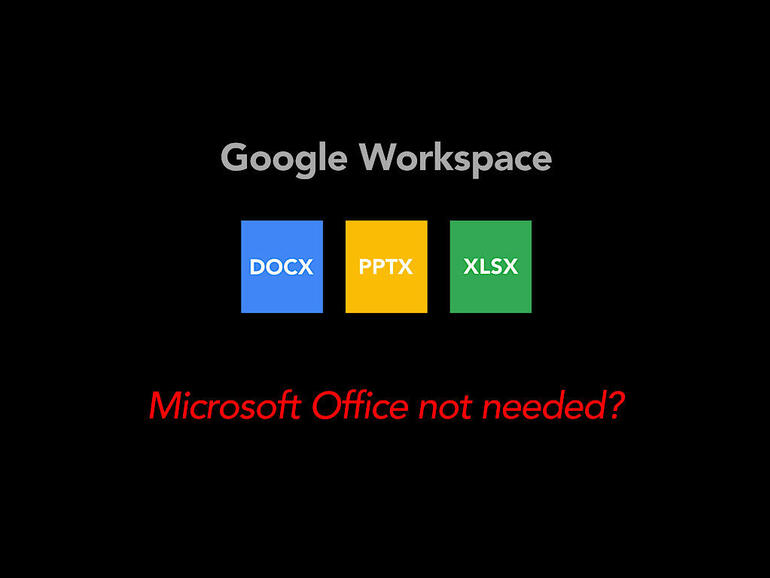Improvements to how people can store, access, and edit Microsoft Office-formatted files in Google Workspace apps means that you may no longer need as many Office apps as in the past.

Image: Andy Wolber/TechRepublic
I’ve worked with organizations that have used Google Workspace (formerly G Suite and Google Apps) for years. In most cases, people in those organizations also used Microsoft Office apps, too. The two suites tended to co-exist, since organizations often had many files in Microsoft Office formats.
Every year, I’d consistently get one question from clients: “Should I install Microsoft Office on my new computers?” Every year, I’d respond, “Yes, you probably still need Office.”
Recently, my answer changed–at least for one organization. I told my client, “You’re welcome to buy Office if you want, but I really don’t think you need it.”
Over the past few years, I explained, Google made several changes to Drive, to the Docs/Sheets/Slides editors, and to Gmail. Here’s more on each of these key improvements that may reduce the need for Microsoft Office apps in organizations that use Google Workspace.
SEE: Google Sheets: Tips and tricks (TechRepublic download)
Google Drive preserves file formats
When you upload any Word, Excel, or PowerPoint file to Google Drive, the files retain their native format. So .doc, .docx, .xls, .xlsx, .ppt, and .pptx files all remain in their respective formats. If you’d prefer to convert files from these formats to the corresponding Google format by default, that’s an option too.
Google Drive Desktop gives a local view
Google Drive Desktop (formerly Google Drive File Stream) provides people who use Windows and macOS operating systems an installed app that delivers a system-friendly way to access files on Google Drive. Drive Desktop lets people browse folders and files, much as they might with the Windows File Explorer or the macOS Finder. Of course, Drive Desktop files are also available in Google Drive online. People may select specific files and/or folders to sync locally, to ensure availability even when disconnected from the internet.
Edit Microsoft Office files in Docs/Sheets/Slides
Google Docs, Sheets, and Slides now let you natively edit and collaborate on Word, Excel, and PowerPoint files. The files retain their original formats too.
At one time in the past, you had to convert files into native Google formats. That meant people often ended up with two files: One in a Microsoft format, and another in a Google format. The days when you’re forced-to-convert-to-collaborate are over though. Want to create a new Google Doc? Go for it. Prefer to open a Microsoft Word file and share it? Both work, and in my experience, both work well.
Open Microsoft Office attachments directly from Gmail
Did you receive a Word/Excel/PowerPoint attachment in your Gmail account from someone who uses Microsoft Office? In Gmail on the web, place your cursor over the attachment, then over the pencil icon, and click/select it to open the item and edit it in Google Docs, Sheets, or Slides. Again, it’s pretty much a point, click, and edit process.
Many people who use Google Workspace will no longer need to install Microsoft Office
In my client’s case, they decided not to install Office on new computers. Their daily work consists of grant proposals and letters, along with lists of organizations, projects, and scholarships. They’ve been gradually moving files over from Microsoft formats to Google formats for at least two years. The combination of their needs, their proficiency with Google Workspace apps, and Google’s steady series of Office-compatibility improvements made the decision possible.
Of course, people in other organizations I work with continue to use both Workspace and Office apps. Some are dedicated power-users of Excel. A few use Publisher or Microsoft Access. Even in those organizations, I’m encouraging them to carefully consider whether they really need to continue paying both for Office and Workspace apps for everyone in the organization.
Does everyone in your organization need and use both Office and Workspace apps? Have the changes mentioned above allowed you to reduce your costs in any way? Let me know what you you have noticed at your organization, either in the comments below or on Twitter (@awolber).
Also see
This article is auto-generated by Algorithm Source: www.techrepublic.com


